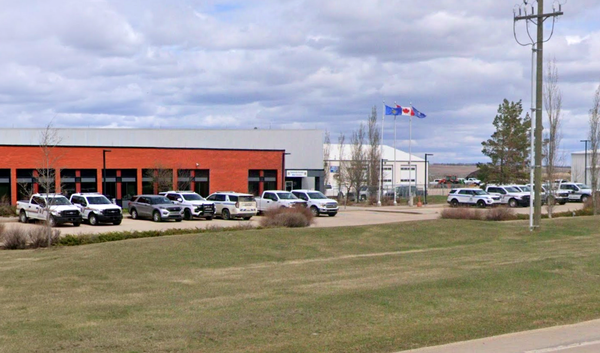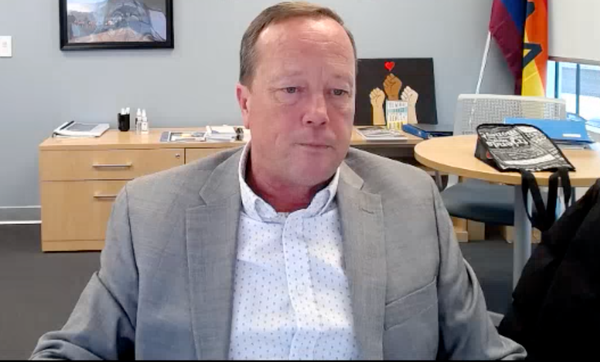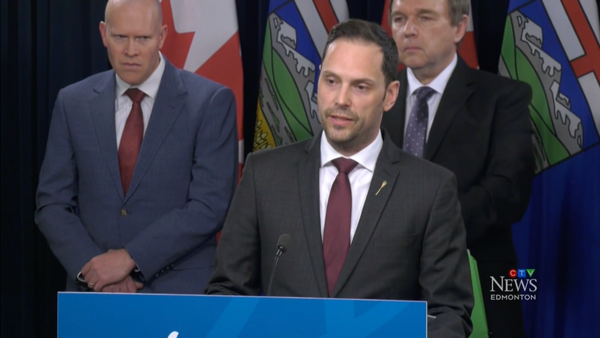"Before May election": Alberta police chiefs organized support for UCP campaign
Alberta Association of Chiefs of Police built a "Coalition of the Willing" to conduct a public advocacy campaign supporting United Conservative Party drug policy with an explicit timeframe "before the May election" in 2023.

The Alberta Association of Chiefs of Police (AACP), an organization led by Calgary Police Chief Mark Neufeld and comprising municipal and RCMP police chiefs, forged a "Coalition of the Willing" to conduct public advocacy supporting United Conservative Party drug policy in the run-up to the May 2023 election, according to a strategy document obtained by Drug Data Decoded.
The document details a project titled "AACP Roadmap to Community Wellbeing - Decriminalization: A Theory of Change" and reveals a coordinated effort by Alberta's top-ranked police officers that skewed the provincial election in favour of maintaining drug criminalization that centres policing.
The AACP Roadmap, linked here in full, provides rare line-of-sight on how police forces work to influence the public, governments and powerbrokers on policy that favours police budgets through sophisticated media and community engagement campaigns.
The AACP Roadmap opens with an overview that frames the problem of "overdoses, death, crime and social disorder" as a problem centred on residents and businesses "feeling less safe" that requires "enhanced action." The second paragraph offers support for Premier Danielle Smith's approach to this problem through her commitment to so-called Recovery-Oriented Systems of Care – in other words, drug policy that tethers housing, employment and freedom from policing to abstinence from drugs.
The overview then pivots to smearing harm reduction advocates as "influential lobby groups" who ignore "associated supports and programming that orient toward reducing problematic substance use" (abstinence-oriented treatment). These statements ignore the tremendous results shown by safe supply programs in helping people reduce and eliminate unregulated fentanyl use and consumption by injection, among many other health-promoting outcomes. They also misrepresent harm reduction advocacy, which is almost exclusively conducted by grassroots volunteer groups with no lobbying power in Alberta.
In fact, given the AACP's declared core functions to "adapt to and influence changing political and social environments" and "influence decision makers on issues impacting community safety (and policing)," while its leaders work to hide their salaries (in excess of $300,000) from the public eye, it seems more fitting to characterize the AACP as an 'influential lobby group.'
At its core, the position taken by the AACP is that harm reduction is fundamentally at odds with abstinence-oriented approaches – that these are "two opposing positions." But the argument made consistently by harm reduction advocates is for expansion of options beyond abstinence-only.
The AACP is careful to emphasize that despite being utterly contradictory to the position taken by the Canadian Association of Chiefs of Police, which explicitly supported decriminalization, the AACP's position is in fact "not substantively different, only stated differently to ensure police were not excluded from important conversations."
This hints at an underlying purpose of the AACP Roadmap: to ensure police are centred in drug policy conversations – to guarantee, as former Calgary Police officer and current Minister of Public Safety Mike Ellis put it while the 2023 provincial election neared, "the police are going to be at the pointy end of the stick... the police will be at the centre of [drug policy]."
The AACP Roadmap then introduces the Community Safety Knowledge Alliance (CSKA), an organization nearly indistinguishable in scope from the AACP itself. With Edmonton Police Chief Dale McFee serving as its chair and president, the CSKA has built a reputation for policy-based evidence-making that shores up police power and aligns it with corporate interests of the tech industry. Among the tech beneficiaries is HelpSeeker, founded by CSKA board member Alina Turner, which sold a series of reports to police forces in 2021-22 that overestimated social service expenditures and inflated the argument for police funding.
Phase 1: Lead-up to Recovery Capital Conference
According to its timelines of planned and completed tactics, the AACP Roadmap was circulated in late January to early February 2023. Recovery Capital Conference (aka Alberta Recovery Conference) took place in Calgary on February 21-22, 2023, and a group of us protested it on the basis that the conference advances exclusionary and coercive policy that harms people who use drugs.
The key tactics outlined in Phase 1 of the AACP Roadmap can be summarized in two prongs. The first prong was the building of collateral such as project branding, infographics and key messages to be presented to community powerbrokers in the run-up to Recovery Capital Conference. Among these powerbrokers were Calgary Downtown Association; Calgary Police Commission in an in camera / closed-door session presented by CSKA; Edmonton Police Commission Governance Committee, which does not appear to list its meeting documents, presented by the CSKA; and Edmonton Building Owners and Managers Association, presented by Edmonton Police Chief and CSKA Chair and President Dale McFee.
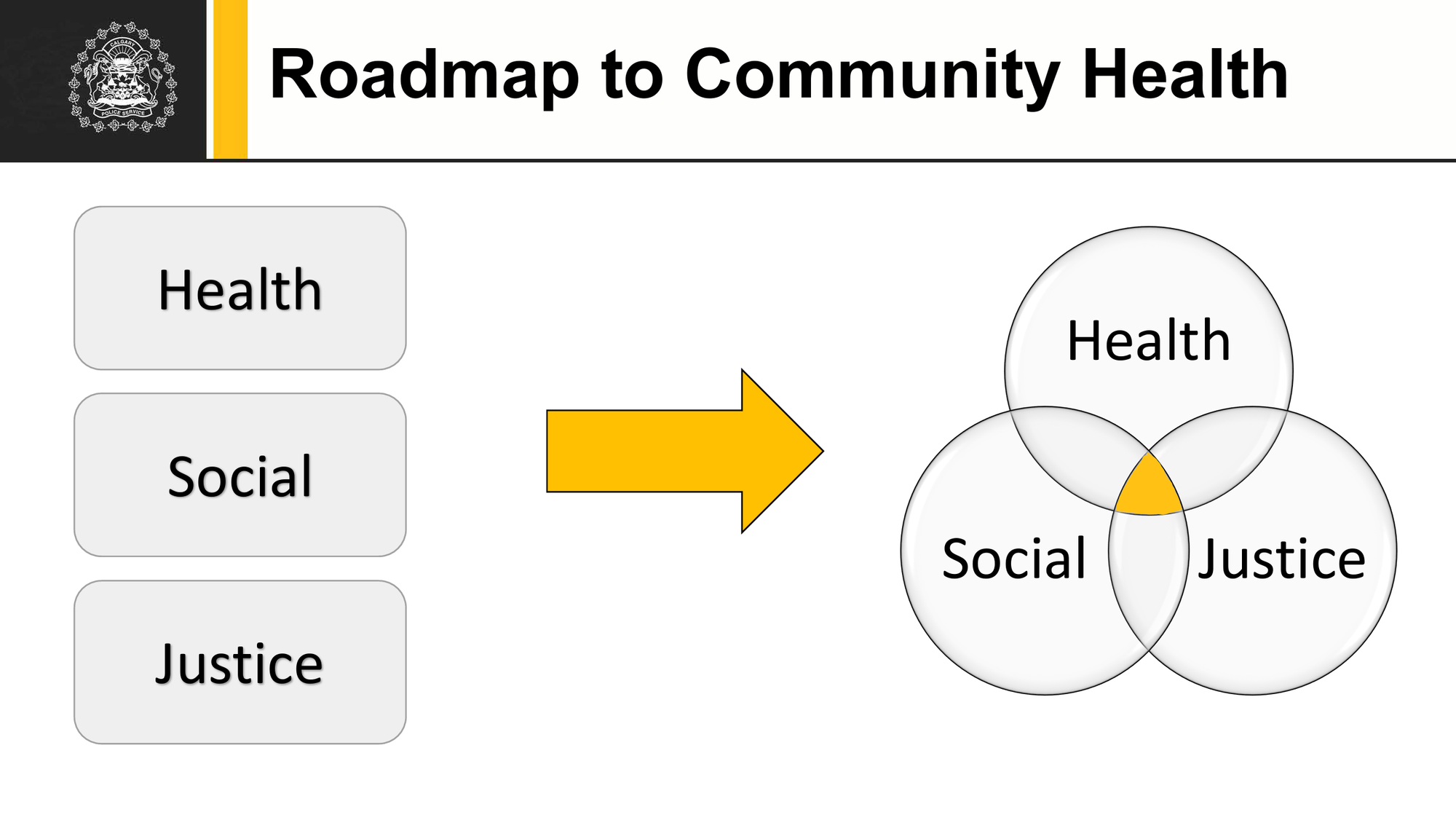
The Recovery Capital Conference panel featured Chief Dale McFee presenting alongside CSKA members Cal Corley, Dr. Janos Botschner and Dr. Julian Somers. A year prior, Somers played a pivotal role in shaping Alberta safe opioid supply policy by preparing a report of "critically low quality" commissioned by the Alberta government.
The conference panel was followed with a coordinated press conference where Chief McFee was joined by Calgary Police Chief and AACP President Mark Neufeld.
The second prong of the tactical approach was to be led by the CSKA driving a media and pseudo-academic blitz with op-ed placements and published research, including a "manuscript submitted for peer review and publication" in the Journal of Community Safety and Well-being – the 'flagship journal' of the CSKA, launched in 2019.
The press conference held after the Recovery Capital Conference panel made a splash among local media, which largely opted for uncritical repeating of police talking points without providing counter-arguments.
While the un-bylined Canadian Press article reprinted by CBC and CityNews failed to make note of the relationship between Chief McFee and the CSKA, Madeline Smith, reporting for the Edmonton Journal, did note the relationship and even discussed the protest. Mark Villani at CTV Calgary and Aryn Toombs at LiveWire Calgary noted the relationship between McFee and the CSKA, but provided little in the way of context or counter-argument.
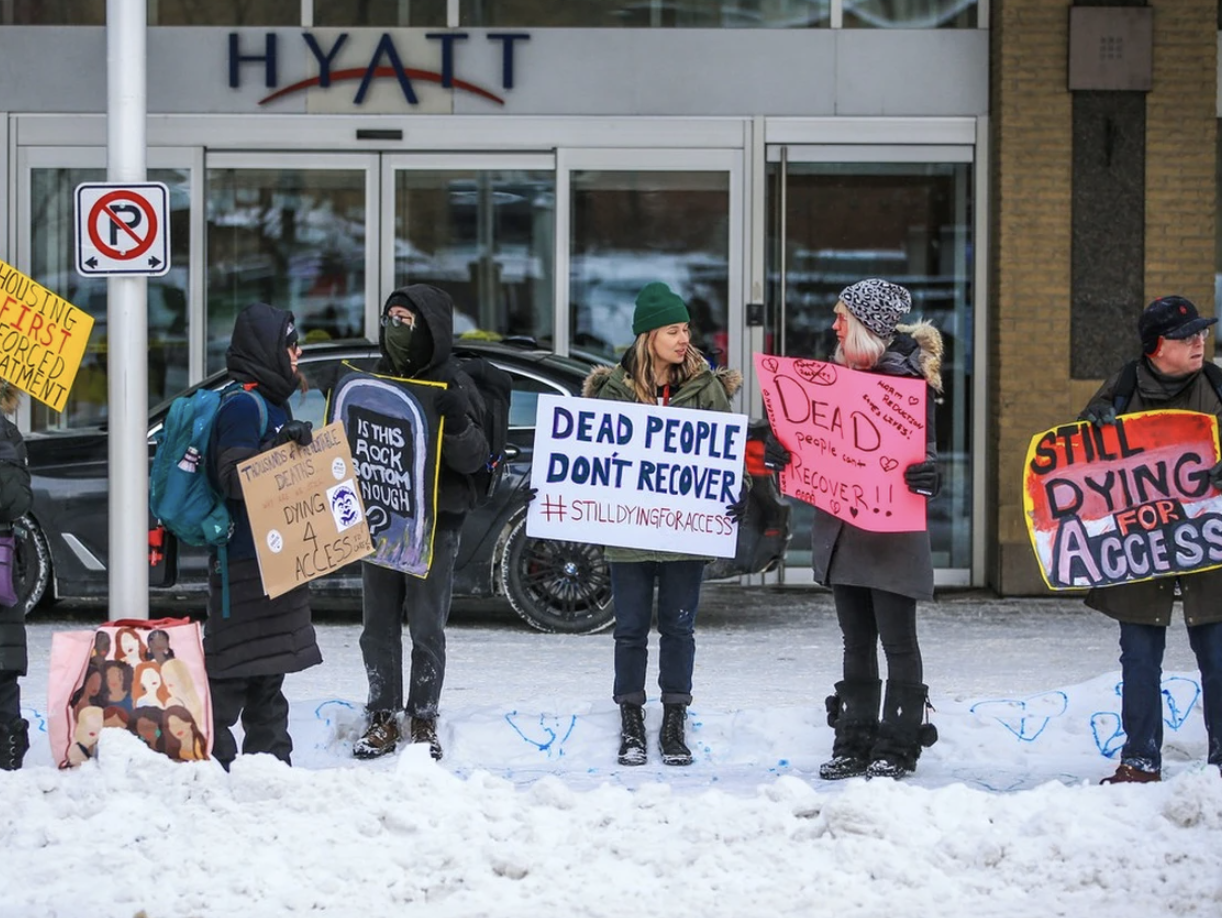
Predictably, Rick Bell's Calgary Sun column the next day shored up the AACP position, ignored the CSKA entirely, and preemptively dismissed accusations that the police chiefs were engaged in propaganda:
"Neufeld does mention when the police come out with something it’s 'shouted down in social media' and written off as 'copaganda.' You know, propaganda for cops."
Four months earlier, CBC Edmonton's Natasha Riebe reported on the conflict of interest apparent in the Edmonton Police Commission's hiring of the CSKA through a sole-source contract to prepare a report on the police funding formula. The report concluded that "the funding formula appears to be serving the City of Edmonton, its police commission and police service well." Riebe noted that in 2021, "Edmonton spent $371 per capita in tax funding for police compared to Calgary's $305 and $350 in Winnipeg."
In the coverage of the AACP press conference that relied on research conducted by the CSKA, the phrase "conflict of interest" appeared only in Madeline Smith's reporting. Ironically, LiveWire primed an extended perspective from Chief McFee with a header that read: "Non-political, but aligned with Alberta government on recovery-oriented care."
Phase 2: Lead-up to May 2023 election
Phase 2 of the AACP Roadmap spanned the Recovery Capital Conference on February 21-22 to the provincial election on May 29, 2023. It is important to underscore that the endpoint of the AACP Roadmap was the 2023 election, as it reveals an unspoken central intention of the campaign: mobilize publicly funded police resources to consolidate community powerbrokers around a United Conservative government, under the guise of simple police alignment with its drug policy agenda.
Eight rows of tactics listed for Phase 2 include a rollout of "media pitches," with the following plan: "Pitch talk media for more in-depth pieces beyond basic announcement. Lead the conversation going into May election." The designated leads on this tactic are the AACP communications working group (members undisclosed), Calgary Police spokesperson Lindsay Nykoluk, and an unidentified spokeperson for the AACP. The timeline for completion is set as "Before May election," and that concludes the entire Phase 2 media strategy.
Additional tactics included the identification of "champions of change" representing people with "diverse perspectives of those with lived experience and the Indigenous, Black and racialized communities." From the 'champions of change,' the AACP intended to form a "Coalition of the Willing" to "identify and implement a roadmap to community wellbeing." The Coalition of the Willing was also to "intersect with provincial task forces for further advocacy and implementation."
There is no acknowledgement within the AACP Roadmap of the most notorious use of the term 'Coalition of the Willing': the 2003 US-led invasion of Iraq that resulted in the deaths of a million or more Iraqis and countless war crimes.
Various audiences are designated within Phase 2 of the AACP Roadmap. Among these is a group singled out as "potential critics" that includes "Moms Stop the Harm, Be the Change YYC, Bear Clan YYC, Each and Every / Euan Thomson, Coalition for Harm Reduction, and Canadian Drug Policy Coalition, Red Deer." It is unclear what is being referenced by "Coalition for Harm Reduction," which does not exist.
The following organizations were listed as community partners that AACP expected to serve as "potential advocates" for its propaganda campaign: Calgary Downtown Association, Alpha House (DOAP), Calgary Homeless Foundation, and Calgary Drop-In Centre. The provincial government funds the latter three organizations at many millions of dollars each year.
Of course, the May 2023 election was settled in favour of the United Conservatives. Their victory, set against a dystopian backdrop of wildfire smoke, was sealed by suburban fear of inner-city Calgary driven by the type of propaganda filling the pages of the AACP Roadmap. Mobilization of police resources called on by the Roadmap allowed its key messages to be conveyed over local airwaves and into luncheons filled with Calgary's elite business and community leaders.
The United Conservatives' win was very much a win for police in Alberta, not unlike Ken Sim riding an unprecedented Vancouver Police Union endorsement to the mayorship in 2022 after promising more cops. And while years of political trench warfare pushed the BC government to decriminalize drugs on January 31, 2023, it took just over a year for relentless lobbying by police, municipal councils and provincial conservative allies to backfill that trench, soaked with the blood of drug users, with faux-populist uproar.
In the other direction, the formal adoption of 'recovery-oriented systems of care' in Saskatchewan and Ontario likely signals similar police interference in public policy across those provinces.
Alberta police chiefs and their Alberta government counterparts understand that to build an abstinence-oriented system of control that drives a steady line of people who use drugs into privatized pseudo-therapy, it is essential to maintain the coercive force of police and justice systems with drug criminalization.
Together, they've accomplished so much.
Drug Data Decoded provides analysis on topics concerning the war on drugs using news sources, publicly available data sets and freedom of information submissions, from which the author draws reasonable opinions. The author is not a journalist.



